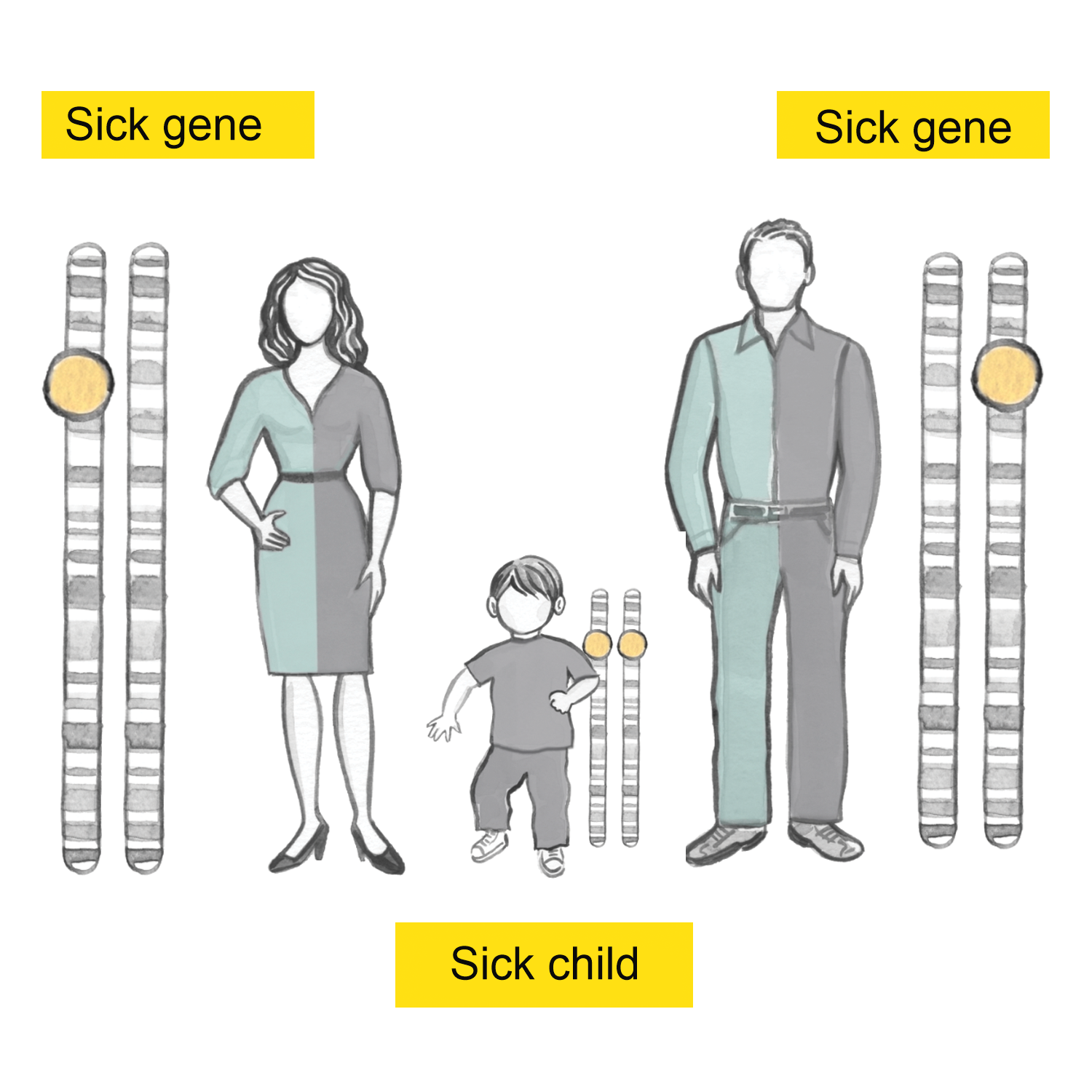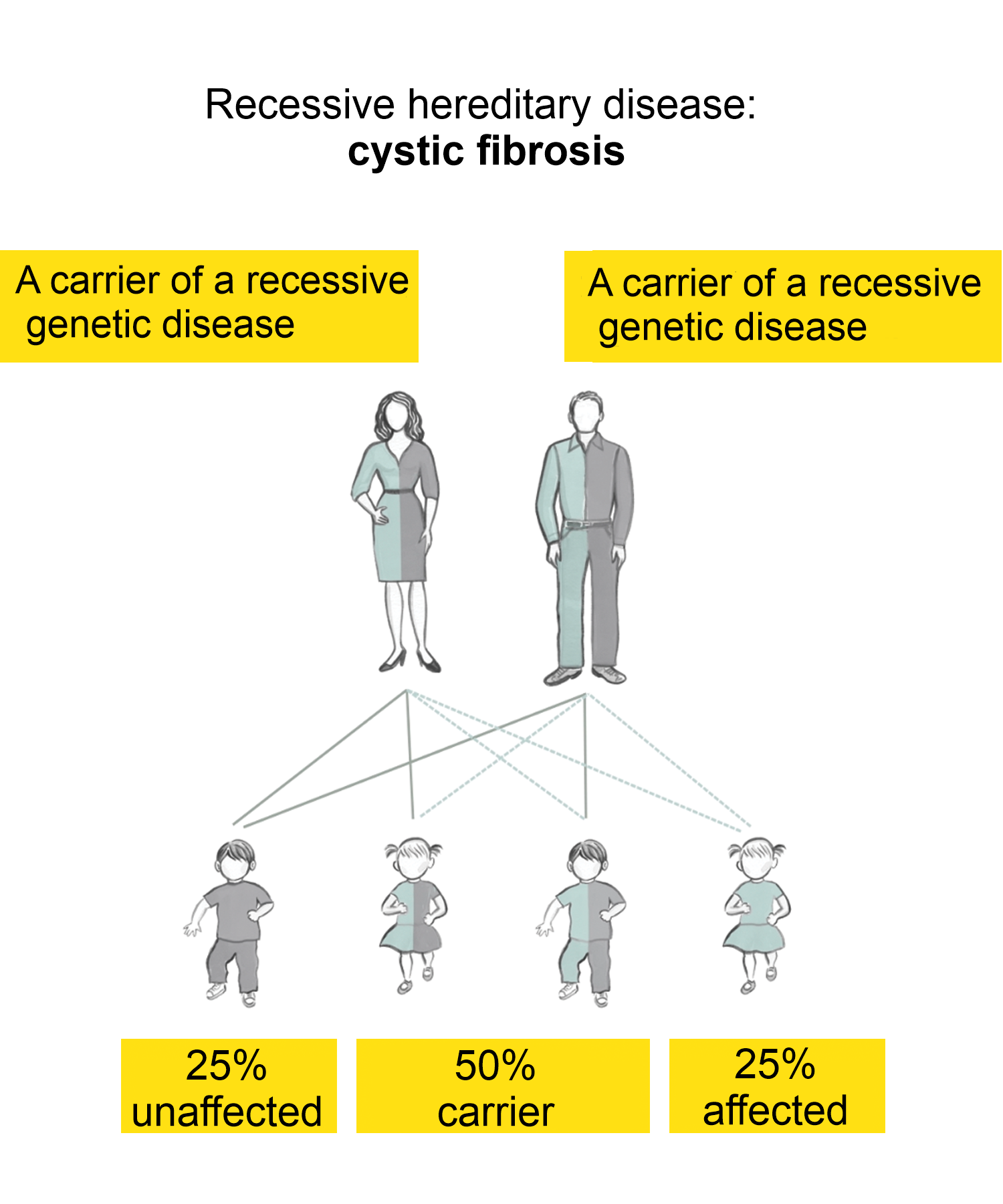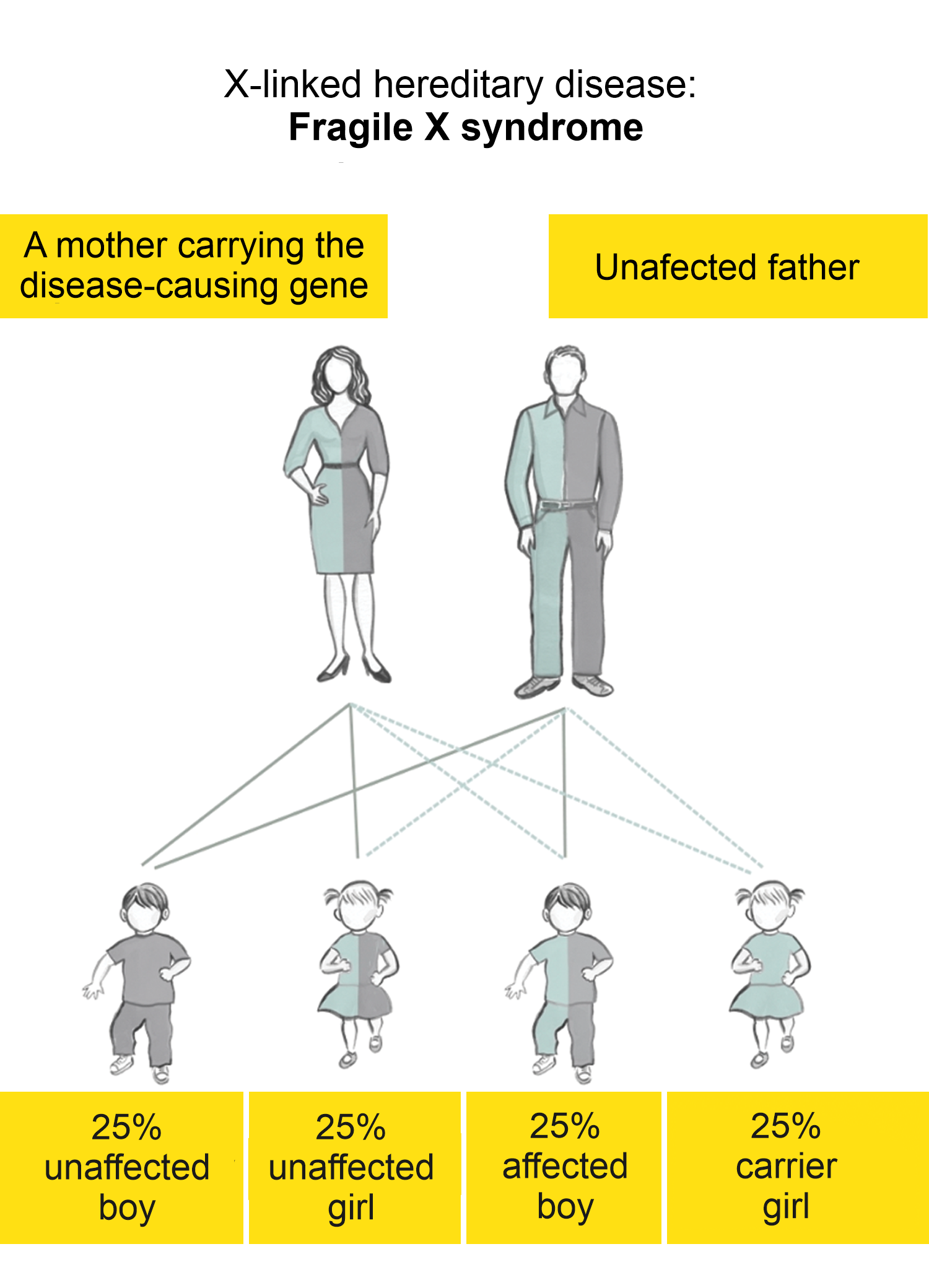Horizon test

Each of us carries an average of at least two genes that cause genetic disease. Carriers of the disease are usually healthy, but they are at significant risk of passing on a serious genetic disease to their children.
The Horizon test is a genetic carrier screening test that allows a woman and/or her partner to determine whether they are a carrier of autosomal recessive or X-linked disease. Such gene mutations can cause 274 different genetic diseases in their common children that cannot be detected by prenatal ultrasound or in the immediate postpartum period, as most of them appear during the first years of life.
The Horizon test is recommended to be done preferably when the family is planning a pregnancy, but it can also be done during the first trimester of pregnancy.
- How is it possible for healthy parents to pass on a genetic disease to their children?
- What is autosomal recessive inheritance?
- How are recessive diseases inherited?
- What is X-linked recessive inheritance?
- How are X-linked diseases inherited through female carriers?
- Is my child at risk for diseases that are not present in our family?
- Can the diseases sought be diagnosed already by prenatal ultrasound?
- How often do these genetic conditions occur?
- What are the alternatives to the Horizon test?
- When will I know my test results?
- What results can I expect from the Horizon test?
- Does a positive screening result mean that the child has the disease being investigated?
- What can we do if we are more likely to have a child with a genetic disease?
- What should I do if I am a carrier of a genetic disease or an X-linked disease?
- Who can be tested and when?
- How is the Horizon test performed?
- Who benefits from performing the Horizon test?
- What genetic diseases can be found when I take the Horizon test?
How is it possible for healthy parents to pass on a genetic disease to their children?
There are two main types of inheritance that can lead to healthy parents having a child with a serious genetic disease. These types of inheritance are autosomal recessive and X-linked inheritance.
What is autosomal recessive inheritance?
Some inherited diseases are inherited recessively. This means that in order for a genetic disease to develop, the child must have a change in both genes of a gene pair (the child inherits a gene copy with one change from each parent). When a child inherits one altered gene and one normal gene from their parent, the normal gene usually compensates for the altered gene in most cases. Thus, the child is the bearer of change, but he does not have the disease.
The most common autosomal recessive diseases are sickle cell anaemia and cystic fibrosis.
How are recessive diseases inherited?
If both parents are carriers of the same gene mutation, they pass either the normal or the altered gene on to their child. The selection is random.

Therefore, every child whose both parents carry the same altered gene has a 1 in 4 (25%) risk of getting a mutated gene from both parents and therefore developing an inherited disease. There is also a chance that in 3 out of 4 cases (75%), the child does not have an inherited disease.
However, in 2 out of 4 cases (50%) there is a possibility that the child inherits a gene with one mutation from their parents. In this case, the child is healthy, but they are also a carrier, just like their parents. But in 1 in 4 cases (25%), there is also a possibility that the child will receive two normal genes from the parents. In this case, the child does not have a genetic disease and is not a carrier of this genetic disease either.
Since the genes causing autosomal recessive diseases are located in the autosome (chromosomes 1–22), the disease manifests the same in both boys and girls. Such risks occur with every pregnancy.
What is X-linked recessive inheritance?
The X chromosome contains several genes that are necessary for growth and development. The Y chromosome is much smaller and has fewer genes. Women have two X chromosomes (XX), and if there is a change in one X chromosome, the normal gene on the other X chromosome can compensate for the change. In this case, the girl is an externally healthy carrier of the X-linked disease. Women who carry the disease are not sick, but they carry a gene with changes. In some of these diseases, women have an easier course of the disease.
Boys have both X and Y chromosomes (XY), and if one gene on the X chromosome is altered, it does not have another gene to compensate for it. Therefore, the boy is sick. Conditions inherited in this way are called X-linked recessive diseases.
The most common X-linked diseases are haemophilia A, Duchenne muscular dystrophy and fragile X syndrome.
How are X-linked diseases inherited through female carriers?
When a female carrier gives birth to a son, she gives her son an X chromosome with a normal gene or an X chromosome with a modified gene. Therefore, in 1 in 2 cases (50%), all sons of carrier mothers have a chance of getting the mutated gene and having the disease. However, in 1 in 2 cases (50%), the son receives a normal gene and does not have the disease. This pattern of inheritance applies to all sons.
When a female carrier has a daughter, she passes on an X chromosome with a normal gene or an X chromosome with a modified gene to her daughter. All daughters have a 1 to 2 (50%) chance to get the mutated gene. If that happens, the daughter is a carrier of changes, as is the mother. However, 1 to 2 (50%) chances are that the daughter will inherit a normal gene. In this case, the daughter is not a carrier and does not have the disease either. This pattern of inheritance applies to all daughters.
Is my child at risk for diseases that are not present in our family?
Yes, they are. As a rule, children with the investigated diseases are born into families where the disease has not occurred before. This risk persists even if the parents have previously had healthy children together. Thus, the birth of a sick child into a family is often unexpected. In Estonia, an average of 13–15 children gets confirmation about a disease that's being screened every year.
Can the diseases sought be diagnosed already by prenatal ultrasound?
Inherited genetic diseases cannot be detected by prenatal ultrasound, and these diseases have not been associated with problems during pregnancy or childbirth either. Even after birth and during the first weeks of life, most of these babies appear to be healthy. The disease occurs later, usually within the first year of life.
How often do these genetic conditions occur?
Hundreds of inherited genetic diseases can affect a child's health, but most of them are very rare. However, taking into account the incidence of all these diseases, these rare diseases affect 1 in 400 children.
Most couples who have a sick child have not had the given disease in their family and have not been aware that they have a higher chance of having a genetically ill child. This happens because a healthy couple can pass on a genetic disease to their child without knowing that they are carriers of the disease. Therefore, screening for the carriage of genetic diseases is important for everyone, whether or not they have relatives with genetic diseases in their family.
What are the alternatives to the Horizon test?
Horizon test is a parental screening test to detect the carriage of autosomal recessive or X-linked diseases. It makes it possible to identify the risk of 274 genetic diseases that parents can unknowingly pass on to their children.
The Horizon test does not detect fetal chromosomal diseases, microdeletions, monogenic diseases or the sex of the fetus. Nor can the Horizon test assess the anatomical structures of the fetus or the complications of pregnancy, such as preeclampsia. If you want information about fetal chromosomal pathologies, microdeletions, monogenic diseases, fetal organ structure development and complications during pregnancy as well, the Horizon test can be combined with the Panorama XP test, Vistara test and the OSCAR test.
In women who have any suspected fetal malformations on ultrasound, invasive diagnostic tests such as chorionic biopsy or amniotic fluid are used to detect more than 99% of all chromosomal abnormalities, including rare chromosomal abnormalities that cannot be detected by the Horizon test or other screening tests. In the case of diagnostic tests, it should be taken into account that in 0.1% of cases they may lead to miscarriage, whether or not the fetus had chromosomal or genetic pathology.
When will I know my test results?
You will know the results of the test 15 days after you have given the blood tests.
What results can I expect from the Horizon test?
As a woman, the Horizon test will give you information on whether you are a carrier of one of the 274 autosomal recessive or X-linked diseases. If you are a man, the Horizon test will give you information on whether you are a carrier of one of the 254 autosomal recessive diseases. Men are not tested for X-linked diseases.
A negative test result greatly reduces the chance that you are a carrier of a genetic disease, but you should be aware that the Horizon test does not detect all gene diseases.
Does a positive screening result mean that the child has the disease being investigated?
No, it does not. The Horizon test examines the parents, not the fetus growing in the womb. If both parents carry a defective gene, there is a risk that the child will be ill in 25% of cases. In the event of such a response, a medical geneticist should be consulted. A diagnostic test for the woman, such as a chorionic biopsy or amniotic fluid test, or a postnatal venous blood test, should be performed to confirm or rule out the presence of the genetic disease in the fetus.
What can we do if we are more likely to have a child with a genetic disease?
If you found out before you became pregnant that you and your partner are carrying the same autosomal recessive genetic disease or that you are a carrier of X-linked disease, then there are several possibilities:
- natural conception and testing the child after childbirth;
- natural conception and a chorionic biopsy during pregnancy to detect fetal genetic disease;
- in vitro fertilization (IVF) and pre-transplant embryo testing for monogenic diseases (PGT-M) to transplant a genetically healthy embryo into the uterus;
- in vitro fertilization using the sperm, ova or embryo of a genetically healthy donor;
- adoption
- abandon the plan to have a child;
- In the case of X-linked recessive disease carriage, we recommend a Panorama test to assess the sex of the fetus, as only boys become ill. No further diagnostic testing is required in the female fetus.
If you found out during pregnancy that you and your partner are carrying the same autosomal recessive genetic disease or that you are a carrier of X-linked disease, then there are several possibilities:
In the case of a child with a disease, you have the right to decide whether to terminate or continue the pregnancy. In case of continuing your pregnancy, you can prepare yourself emotionally for the birth of a sick baby.
What should I do if I am a carrier of a genetic disease or an X-linked disease?
In this case, you should talk about it with other family members as well. They will then have the opportunity to take a Horizon test if they wish, to see if they are also carriers of the genetic disease. This information may be needed to diagnose the disease in other family members. This can be especially important for those who already have children or are planning to have children in the future.
The Horizon test is performed on both partners to detect autosomal recessive diseases. To detect X-linked diseases, it is enough for only the woman to be tested. . The Horizon test should preferably be performed before pregnancy, but can also be performed during the first trimester of pregnancy.
How is the Horizon test performed?
For the Horizon test, venous blood from both partners is required and sent to the San Carlos Natera Laboratory for DNA isolation and second-generation sequencing.
Who benefits from performing the Horizon test?
- Couples of a particular ethnic background or in a kinship marriage, who may be at higher risk for genetic disease
- A couple planning to become pregnant, if one or both partners have relatives with mental underdevelopment or any genetic diseases in the family


